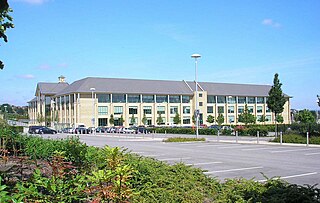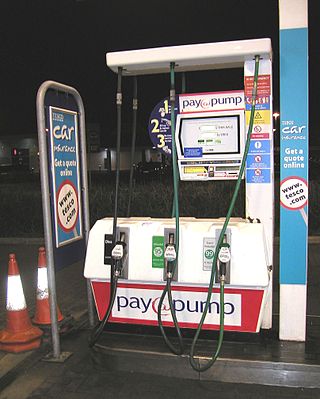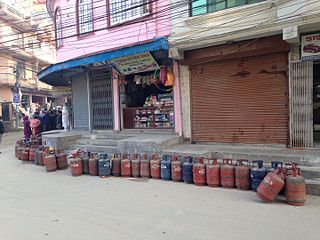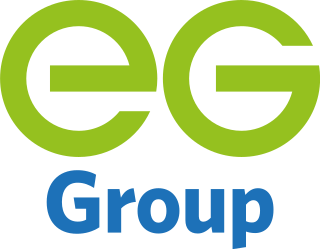
Wm Morrison Supermarkets Limited, trading as Morrisons, is the fifth largest supermarket chain in the United Kingdom. As of 2021, the company had 497 supermarkets across England, Wales and Scotland, and one in Gibraltar. The company is headquartered in Bradford, England.
An energy crisis or energy shortage is any significant bottleneck in the supply of energy resources to an economy. In literature, it often refers to one of the energy sources used at a certain time and place, in particular, those that supply national electricity grids or those used as fuel in industrial development. Population growth has led to a surge in the global demand for energy in recent years. In the 2000s, this new demand – together with Middle East tension, the falling value of the US dollar, dwindling oil reserves, concerns over peak oil, and oil price speculation – triggered the 2000s energy crisis, which saw the price of oil reach an all-time high of $147.30 per barrel ($926/m3) in 2008.

The fuel protests in the United Kingdom were a series of campaigns held in response to the rising petrol and diesel fuel prices for road vehicle use. There have been three major campaigns amongst many other protests in the 21st century. The first major protest in 2000 was primarily led by independent lorry owner-operators. One group of lorry owner-operators from the South East of England formed a protest group called "TransAction" that protested at oil refineries and fuel depots in Essex. Protests and blockades of oil facilities caused widespread disruption to the supply of petroleum products. The aim of the protests was to secure a reduction in the fuel duty rate on petrol and diesel, which the government refused to enact. After the protest ended, the government did announce a freeze on fuel duties, and promised changes would be made to the way that goods vehicles were taxed, which would include the taxing of foreign vehicles operating on British roads.

Rosslare Europort is a modern seaport located at Rosslare Harbour in County Wexford, Ireland, near the southeasternmost point of the island of Ireland. The port is the primary Irish port serving the European Continent with 36 direct services to the Continent weekly. It handles passenger and freight ferries to and from Cherbourg, Dunkirk, St Malo and Roscoff, in France, Bilbao in Spain and Fishguard and Pembroke Dock in the United Kingdom. Since July 2022, a new freight route between Rosslare and Zeebrugge, Belgium was introduced by Finnlines for a twice weekly ro-ro service between the two ports.

Rationing was introduced temporarily by the British government several times during the 20th century, during and immediately after a war.

A truck driver is a person who earns a living as the driver of a truck, which is commonly defined as a large goods vehicle (LGV) or heavy goods vehicle (HGV).

Panic buying occurs when consumers buy unusually large amounts of a product in anticipation of, or after, a disaster or perceived disaster, or in anticipation of a large price increase, or shortage.

"Too Close" is a song by American R&B group Next featuring uncredited vocals from Vee of Koffee Brown. It contains a sample of "Christmas Rappin" by Kurtis Blow and was released on January 27, 1998, as the second single from their debut album, Rated Next (1997). The song reached number one on the US Hot 100 and R&B charts, topping the former for five non-consecutive weeks, and has gone platinum, making it their biggest and best-known hit.

The usage and pricing of gasoline results from factors such as crude oil prices, processing and distribution costs, local demand, the strength of local currencies, local taxation or subsidy, and the availability of local sources of gasoline (supply). Since fuels are traded worldwide, the trade prices are similar. The price paid by consumers largely reflects national pricing policy. Most countries impose taxes on gasoline (petrol), which causes air pollution and climate change; whereas a few, such as Venezuela, subsidize the cost. Some country's taxes do not cover all the negative externalities, that is they do not make the polluter pay the full cost. Western countries have among the highest usage rates per person. The largest consumer is the United States.

The 2007 United Kingdom petrol contamination problem arose on 28 February 2007, when motorists in South East England reported that their cars were breaking down. This was caused by silicon contaminated unleaded petrol, sold by several supermarkets, that damaged the lambda sensors in engine management systems.

Murco is an oil refining company based in the United Kingdom. It was set up by Murphy Oil Corporation in 1960. The company owns a forecourt-based chain of convenience stores of Costcutter. Murco purchased a 30% stake in Amoco’s Milford Haven Refinery in 1981, and the remaining 70% in 2007.
In March 2012 Unite trades union warned it was considering a strike over health and safety standards. Unite represents around 2,000 tanker drivers, who deliver fuel to 90% of Britain's forecourts. Although no strike took place, Government action precipitated panic-buying and a woman was seriously injured after following a minister's advice to store extra petrol.

Road pricing in the United Kingdom used to be limited to conventional tolls in some bridges, tunnels and also for some major roads during the period of the Turnpike trusts. The term road pricing itself only came into common use however with publication of the Smeed Report in 1964 which considered how to implement congestion charging in urban areas as a transport demand management method to reduce traffic congestion.

Brexit was the withdrawal of the United Kingdom from the European Union.
Eddie Stobart Limited is a British multimodal logistics company, with interests in road haulage, rail freight, deep sea and inland waterway transport systems and deep sea port, inland port and rail connected storage facilities, along with transport, handling and warehousing facilities in the United Kingdom, Ireland and Belgium.

The 2015 India Blockade of Nepal, which began on 23 September 2015 and lasted about six months, was an economic and humanitarian crisis that severely affected Nepal and its economy.

EG Group Limited is a British operator of filling stations, convenience stores and food service providers across Europe, the United States and Australia. It was founded in Blackburn in 2001 by brothers Mohsin and Zuber Issa, initially as Euro Garages.
Sri Lanka, from 3 November 2017 until 11 November 2017, faced a fuel shortage when a substandard fuel shipment was rejected which caused a depletion in reserves due to the general public fearing of a prolonged duration of crisis. However, there was only a shortage of petrol not diesel or kerosene.

The following is a timeline of the COVID-19 pandemic in the United Kingdom from July 2021 to December 2021.
The 2021–2022 global energy crisis has caused varying effects in different parts of the world.


















